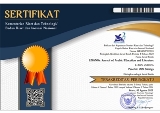Oral Reading Fluency (ORF) Method to Improve Arabic Reading Comprehension
Abstract
The purpose of this study was to describe the use of the Oral Reading Fluency (ORF) method and to show the effectiveness of its use in Arabic reading at Muhamamdiyah University Malang. The method used in this research was descriptive quantitative with the Arabic education department students as the objects. The instruments used for the data collection were questionnaire and observation sheet, while the data analysis used the percentage of student responses. This research was conducted on four meetings. Each meeting had different text with a range of 125 - 140 words and a different final evaluation. This method implements a bear-back manner of reading quickly and at a specified time. The results of this study indicated that the ORF method is very helpful for students to be able to read Arabic texts fluently and accurately. It is proven that 50% of students give positive response to the application of this method. This method can also help improve the ability to understand the contents of Arabic text which has been one of the problems in learning Arabic language skills. It was proven that at the end of the meeting 85% of students completed the material with perfect scores.
Keywords
Full Text:
PDFReferences
Abd Ghani, A., Muslim, N. H., & Zakaria, M. N. (2020). The effects of gender and academic achievement on reading fluency among Year 2 Malaysian school children. International Journal of Pediatric Otorhinolaryngology, 132, 109907. https://doi.org/10.1016/j.ijporl.2020.109907
Aizid, R. (2011). Bisa Baca Secepat Kilat (Super Quick Reading). Yogyakarta: Buku Biru.
Alqahtani, S. S. (2020). iPad and repeated reading to improve reading comprehension for young adults with intellectual disability. Research in Developmental Disabilities, 103, 103703.
Aqib, Z., & Amrullah, A. (2009). Penelitian Tindakan Kelas, Teori dan Aplikasi. Bandung: Yrama Media.
Blazauskas, T., Limanauskiene, V., & Kersiene, V. (2012). Competition Based Online Social Learning. In International Conference on Information and Software Technologies (pp. 388–396). Springer.
Dewi, N. N. A. I., Omegantini, M. S., Dian, N. P. J., & Disa, D. (2019). Efektivitas Media Gambar Terhadap Recall Memory Pada Mata Pelajaran IPS Bagi Siswa Kelas III SD. Jurnal Psikologi Mandala, 1(1). http://dx.doi.org/10.36002/jpm.v1i1.583
Fattah, M., & Yamin, M. (2014). Efektivitas Model Kooperatif untuk Meningkatkan Kemampuan Membaca Teks Bahasa Arab Mahasiswa PESKAM STAIN Samarinda. FENOMENA, 6(1).
Hanani, N. (2015). Model Pembelajaran Bahasa Arab di Pondok Pesantren Salaf Kediri dan Kontribusinya terhadap Kemampuan Membaca Teks Berbahasa Arab bagi Santri. Realita: Jurnal Penelitian Dan Kebudayaan Islam, 13(1).
Islam, A. M. S. (2015). Faktor Demotivasi Pembelajaran Bahasa Arab dalam Perspektif Siswa Madrasah. Arabiyât: Jurnal Pendidikan Bahasa Arab Dan Kebahasaaraban, 2(1), 1–16. https://doi.org/10.15408/a.v2i1.1511
Istiqomah, D., Diner, L., & Wardhana, C. K. (2015). Analisis Kesulitan Belajar Bahasa Jepang Siswa SMK Bagimu Negeriku Semarang. Chi’e: Journal of Japanese Learning and Teaching, 4(1). https://doi.org/10.15294/chie.v4i1.8422
Jamhuri, M. J. M. (2016). Penggunaan Metode Drill dalam Meningkatkan Kemampuan Membaca al-Qur’an Siswa di SMK Dewantoro Purwosari. AL MURABBI, 1(2), 201–216.
Jayani, S., & Hastjarjo, T. D. (2011). Pengaruh Frekuensi Pemberian Tes Terhadap Memori Jangka Panjang Bacaan Pada Siswa SMA. Jurnal Psikologi Tabularasa, 6(2).
Julianto, V., Dzulqaidah, R. P., & Salsabila, S. N. (2014). Pengaruh mendengarkan murattal Al Quran terhadap peningkatan kemampuan konsentrasi. Psympathic: Jurnal Ilmiah Psikologi, 1(2), 120–129.
Kadji, Y. (2012). Tentang Teori Motivasi. Jurnal Inovasi, 9(01).
Kamalasari, V. (2012). Latihan Membaca Cepat Sebagai Upaya Meningkatkan Kemampuan Membaca Cepat dan Pemahaman Bacaan. Basastra, 1(1).
Kartika, L., & Mastuti, E. (2012). Motivasi Membaca Literatur Berbahasa Inggris pada Mahasiswa Psikologi Universitas Airlangga Surabaya. Jurnal Insan Media Psikologi, 13(3).
Kurniawati, D. (2015). Studi Tentang Faktor-Faktor Penyebab Kesulitan Belajar Menyimak Bahasa Inggris Pada Mahasiswa Semester III PBI IAIN Raden Intan Lampung Tahun Pelajaran 2015/2016. English Education: Jurnal Tadris Bahasa Inggris, 8(1), 157–178. https://doi.org/10.24042/ee-jtbi.v8i1.515
Łockiewicz, M., & Jaskulska, M. (2019). NL reading skills mediate the relationship between NL phonological processing skills and a foreign language (FL) reading skills in students with and without dyslexia: a case of a NL (Polish) and FL (English) with different degrees of orthographic consistency. Annals of Dyslexia, 69(2), 219–242. https://doi.org/10.1007/s11881-019-00181-x
Mahbubah, L., Biahmada, A. M. M., & Mauludiyah, L. (2019). Learning Arabic Translation at Islamic Boarding School in Madura. Izdihar: Journal of Arabic Language Teaching, Linguistics, and Literature, 2(3), 231–242. https://doi.org/10.22219/jiz.v2i3.10578
Marhaendro, A. S. D. (2010). MODEL PEMBELAJARAN PENDIDIKAN JASMANI BERBASIS KOMPETISI. Jurnal Pendidikan Jasmani Indonesia, 7(2).
Megawati, F. (2016). Kesulitan mahasiswa dalam mencapai pembelajaran bahasa Inggris secara efektif. PEDAGOGIA: Jurnal Pendidikan, 5(2), 147–156. https://doi.org/10.21070/pedagogia.v5i2.246
Munawaroh, B., Madyono, S., & Suwarti, S. (2018). Teknik Membaca Sekilas (Skimming) dalam Meningkatkan Kemampuan Memahami Teks Narasi. Wahana Sekolah Dasar, 26(1), 7–12.
Nurcahyani, N. (2018). RECALL MEMORY PADA DONGENG KARANGAN SISWA KELAS VII SMP. BASINDO: Jurnal Kajian Bahasa, Sastra Indonesia, Dan Pembelajarannya, 2(1), 65–73.
Nuryana, A., & Purwanto, S. (2010). Efektivitas brain gym dalam meningkatkan konsentrasi belajar pada anak. Indigenous: Jurnal Ilmiah Psikologi, 12(1). https://doi.org/10.23917/indigenous.v12i1.1558
RADESI, N. I. M. D., Marhaeni, A. A. I. N., & Natajaya, I. N. (2013). Pengaruh penerapan model Concentrated Language Encounter (CLE) terhadap kemampuan membaca pemahaman bahasa Inggris ditinjau dari motivasi berprestasi siswa Kelas XI di SMA Negeri 2 Amlapura. Jurnal Administrasi Pendidikan Indonesia, 4(1).
Reed, D. K., Zimmermann, L. M., Reeger, A. J., & Aloe, A. M. (2019). The effects of varied practice on the oral reading fluency of fourth-grade students. Journal of School Psychology, 77, 24–35. https://doi.org/10.1016/j.jsp.2019.10.003
Regueras, L. M., Verdú, E., Verdú, M. J., Pérez, M. Á., de Castro, J. P., & Muñoz, M. F. (2008). Motivating students through on-line competition: An analysis of satisfaction and learning styles. In International Conference on Web-Based Learning (pp. 167–177). Springer.
Romansyah, K. (2017). Strategi Membaca Pemahaman yang Efektif dan Efisien. Deiksis: Jurnal Pendidikan Bahasa Dan Sastra Indonesia, 4(1), 69–76. http://dx.doi.org/10.33603/deiksis.v4i1.407
Sunan, J. P. B. A. U. I. N. (2015). Pengembangan Diri dan Pembiasaan dalam Pembelajaran “Bahasa.” Al-Mahara:Jurnal Pendidikan Bahasa Arab, 1(1), 23–52. https://doi.org/10.14421/almahara.2015.011-02
DOI: https://doi.org/10.18326/lisania.v4i2.127-139
Refbacks
- There are currently no refbacks.
Copyright (c) 2020 Lailatul Mauludiyah
View My Stats







